The "Basic Science and Artificial Intelligence Forum", initiated by Mr. Shing-Tung Yau, chairman of the first International Congress of Basic Science Forum, was held at the National Science and Technology Communication Center on the afternoon of July 23. The forum invited Mr.Shen Xiangyang, foreign academician of the National Academy of Engineering, president of the Royal Academy of Engineering, the Guangdong-Hong Kong-Macao Greater Bay Area Digital Economy Institute, chairman of the Board of Trustees of Hong Kong University of Science and Technology, and double professor of the Institute of Advanced Studies of Tsinghua University, Mr.Zhang Jianwei, academician of German National Academy of Engineering, Outstanding visiting professor of Tsinghua University, professor of German University of Hamburg, director of the Institute of Multimodal Intelligent Systems, Mr.Zhou Ming, founder and CEO of Lanzhou Technology, Vice Chairman of CCF of China Computer Society and Chief Scientist of Innovation Works, and Mr.Greg Yang (Yang Ge), founding member of xAI and other important guests in the field of AI attended the meeting. Mr.Sun Maosong, professor of Department of Computer Science and Technology of Tsinghua University, executive Vice President of Research Institute of Artificial Intelligence of Tsinghua University, foreign academician of European Academy of Sciences, member of International Society of Computational Linguistics (ACL), member of Chinese Society of Artificial Intelligence, and president of Chinese Information Society hosted the forum.
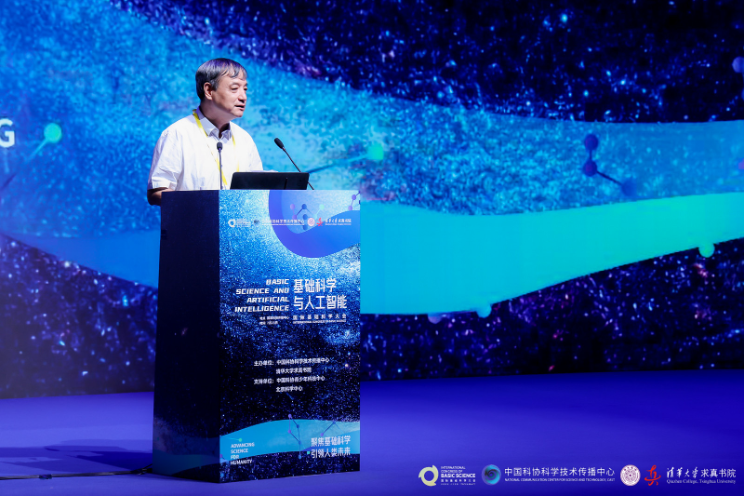
Picture: Mr. Sun Maosong presided over the forum
Shing-Tung Yau, the Fields Prize winner and president of the Basic Science and Artificial Intelligence Forum, delivered a video address to the forum. Mr.Yau said that the creation of the Basic Science and Artificial Intelligence Forum is of great historic significance, for the first time, world-class scholars in the three basic disciplines, including mathematics, theoretical physics, theoretical computer and information science, have gathered together to promote mutual learning and exchange and enable interdisciplinary innovation in different disciplines. He pointed out that the development of mathematics has a history of more than two thousand years, especially in the past three hundred years have emerged and accumulated many important ideas and knowledge. The development of basic disciplines such as mathematics and physics requires the extensive use of new-generation technologies such as artificial intelligence to promote the development of basic science. He encouraged young scientists to fundamentally understand and apply AI, and play an important role in the wide application of AI.
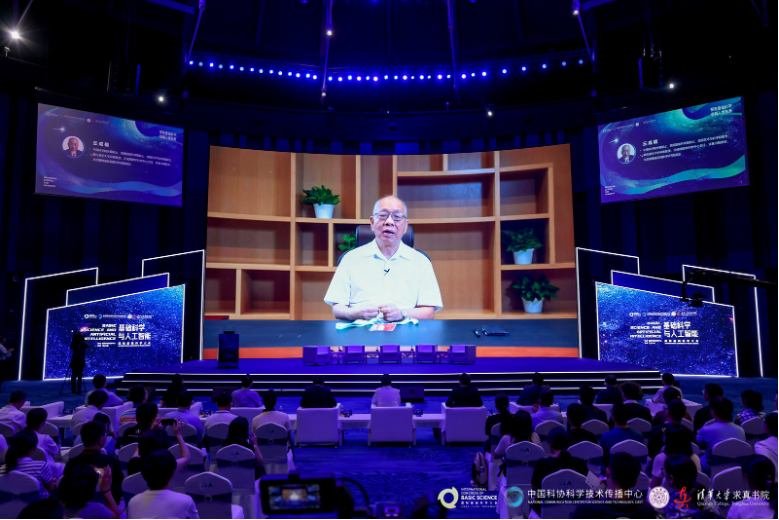
Picture: Mr.Yau delivered a video speech.
The roundtable dialogue focused on the theme of "Big Model and General Artificial Intelligence: Problems and Challenges". Shen Xiangyang, Zhang Jianwei and Zhou Ming respectively made brief keynote speeches and conducted in-depth discussions and exchanges.
Shen Xiangyang said that behind the new things with learning characteristics must contain profound mathematical principles. He proposed five important issues, including the relationship between intelligence and model scale, the generation stage of intelligence in the process of training large models, the impact of data on intelligence, the generation mechanism of intelligent emergence, the correct use of mathematical tools, etc., and focused on these five issues. He noted the profound significance of exploring the relationship between basic science and artificial intelligence, “Math for AI and AI for math!”.
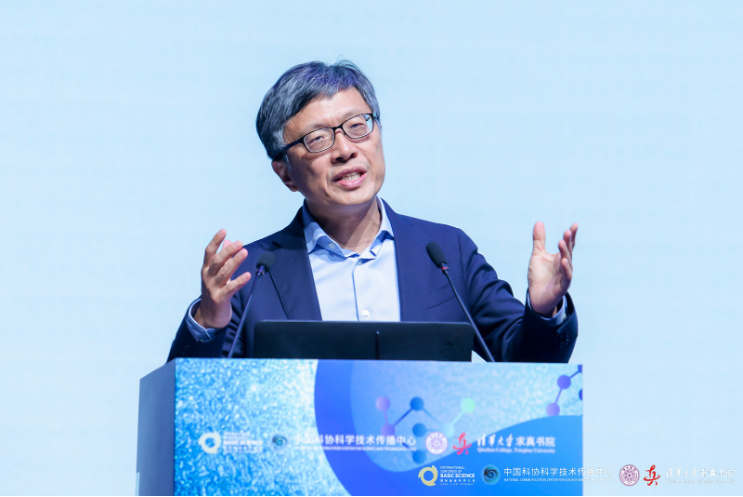
Picture: Shen Xiangyang spoke.
Zhang Jianwei proposed "Science for robot and robot for science" from the perspective of robot research. He pointed out that the mathematical model, physical model, biological model and brain science model has a strong realistic need, the current robot progress mainly focused on the underlying modeling and control, but the traditional physical model is difficult to adapt to the interaction environment change, an urgent need to model training and deep learning fusion, this is the robot in the face of the future dynamic and non-structure under the important topic of environmental research. In the next step, he said we would continue to explore the better application of robot knowledge learning in practice, and strengthen the research in embodied intelligence, multi-modal AI, general robot and other aspects.He thought the method of driving AI based on physics, physiology, model and big data is the only way to realize intelligent robots in the future.
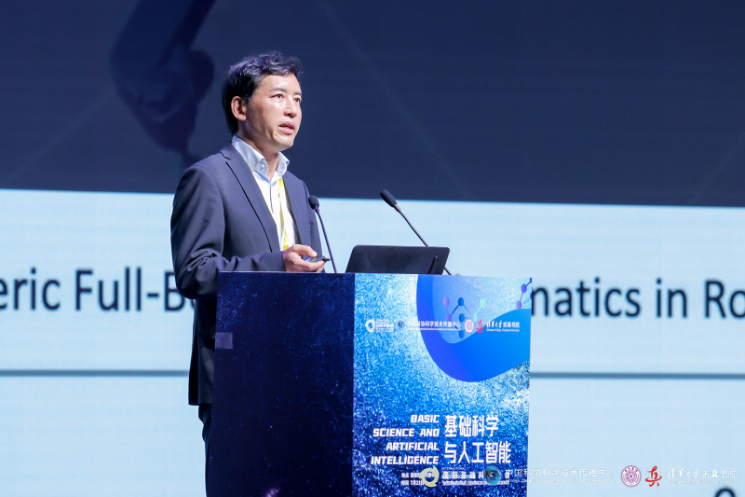
Picture: Zhang Jianwei spoke.
Zhou Ming's speech focused on "How to create value with the big model: from the general model to the industry model and then to the scene model", emphasizing the importance of practical application and academic research to form a good feedback mechanism. He introduced the development process of the large model, focusing on analyzing the landing path of the large model from three levels: general large model, industry large model and scene large model, and sorting out the hierarchical landing system of the specific cases of the large financial model. Zhou Ming said that for the sake of cost saving for enterprises, we use the Mencius model of ten billion level parameters. Compared with the ChatGPT of 175 billion parameters, there are still some deficiencies in the general field. However, adding sufficient industry data based on the ten billion model can now replace ChatGPT in the field of amount management. He finally explained how to create value with mencius' three-layer model system through the Lanzhou conference assistant system implemented based on this model.
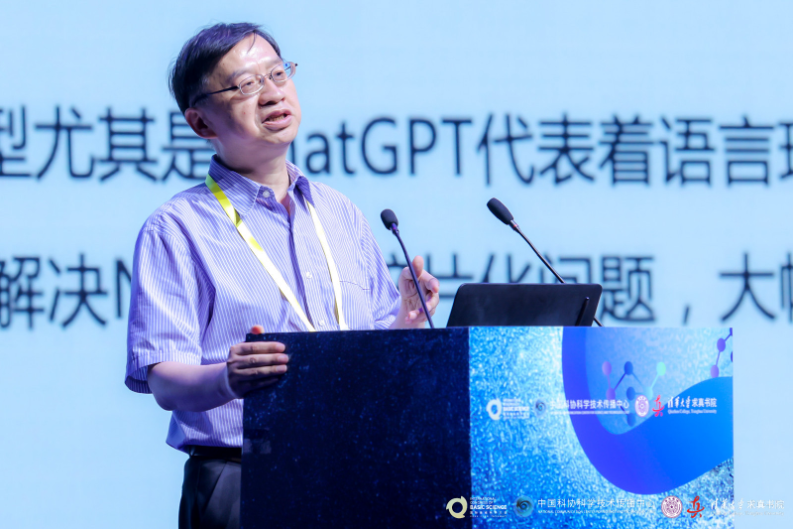
Picture: Zhou Ming spoke.
After the speech, under the Sun Maosong, experts around the possibility of large model boundary, data sets and training sets, computer vision, knowledge map frontier problems in-depth discussion, and higher education and talent training how to better stimulate innovation research put forward their respective views, encourage everyone to keep interest enthusiasm, brave to pursue dreams.
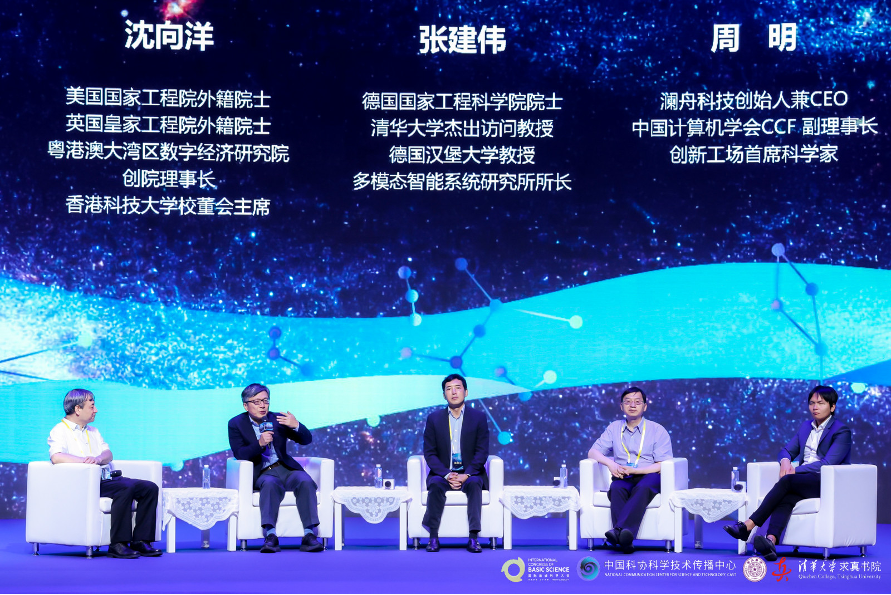
Picture: Dialogue time.
During the keynote speech session, Young Ge, a founding member of xAI, titled "The unreasonable effectiveness of mathematics in large scale deep learning", Important issues such as multi-level perception, maximum update parameterization, and kinetic dichotomy theorem, respectively, And proposed "Optimal Scaling Thesis", Analyze the dynamic relationship between the boundary constraints of the theoretical model scale and the optimal model scale at the practice level, Emphasizing the use of mathematical tools opens up a new perspective for the development of artificial intelligence. After the keynote report, Young answered audience questions about research paradigms, neural networks, model training, learning methods, and career planning.
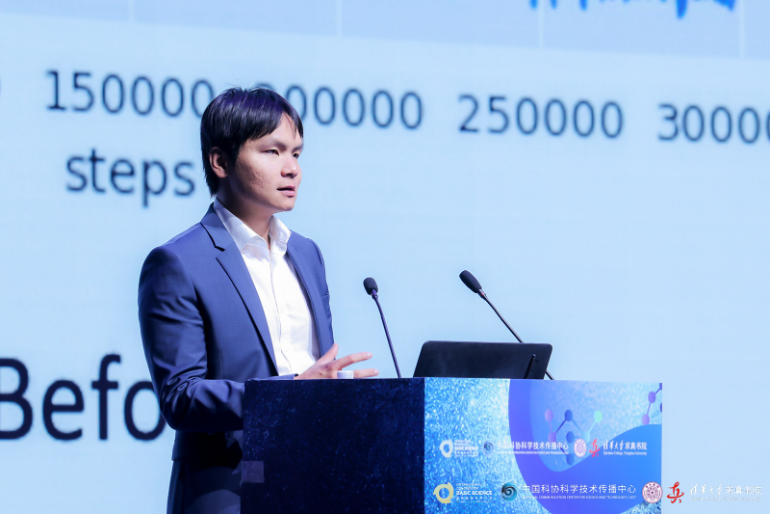
Picture: Yang Ge’s speech.
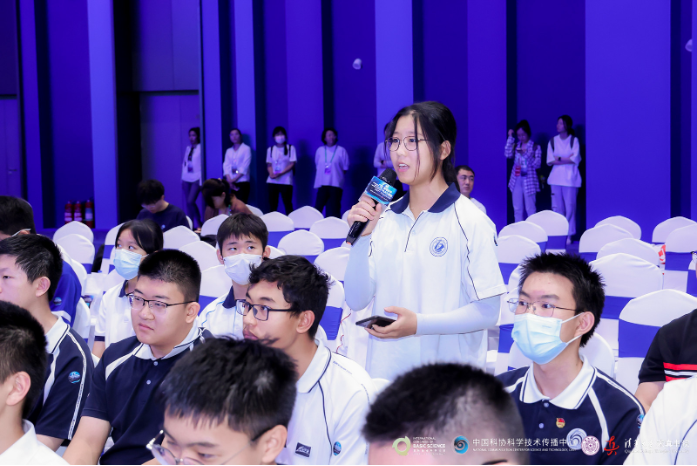
Picture: Students from many middle schools in Beijing and the Qiuzhen College of Tsinghua University asked questions.
The Basic Science and Artificial Intelligence Forum is a top international academic conference in the field of basic science. It closely follows major national strategies and promotes open cooperation in the field of basic science, which has aroused strong response and wide attention. With the theme of "Focusing on Basic Science, Leading the Future of humankind", the conference gathered more than 800 top scholars from around the world to attend the conference to discuss the cutting-edge achievements and future trends, and promote the progress and development of discipline civilization! Basic Science and Artificial Intelligence Forum is one of the series of academic activities of the International Congress of Basic Science Forum, which has attracted wide attention from all sectors of society. The forum is hosted by Science and Technology Communication Center of China Association for Science and Technology and Qiuzhen College of Tsinghua University, and co-organized by Youth Science and Technology Center of China Association for Science and Technology and Beijing Science Center. The forum attracted more than 600 representatives from Baidu, Intel, Microsoft Research Asia, Jingdong, Meituan, Zhiyuan Research Institute and other scientists and industries, as well as students from Qiuzhen College of Tsinghua University and more than 10 outstanding high schools in Beijing.
Text | Zhou Zhi
Typography | Gong Wei
Audit | Wang Xiaofang, Xie Lufang
Translation | Gao Xudong